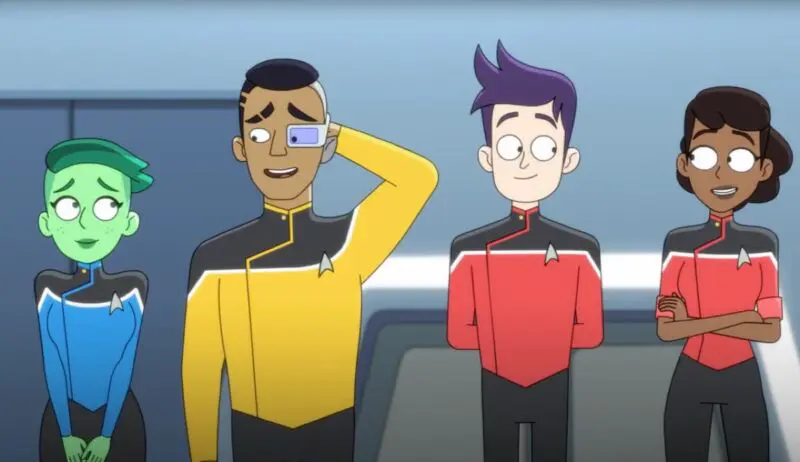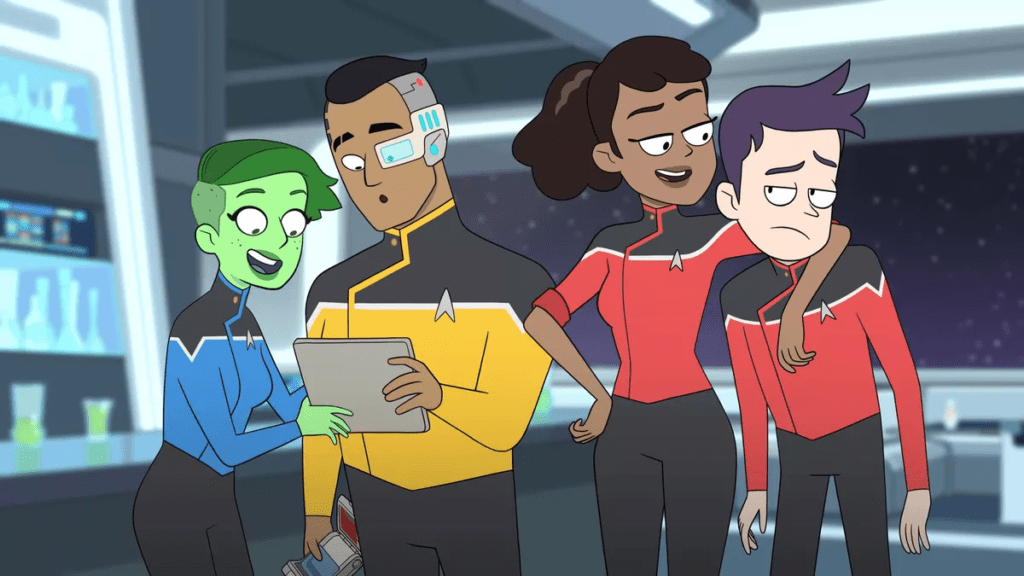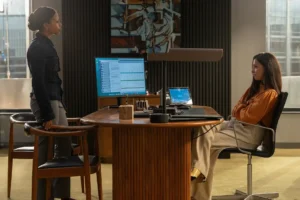Summary
Star Trek: Lower Decks has its charms, and its self-referential energy will delight those in the know, but where it fits within Trek’s longstanding legacy remains to be seen.
This review of Star Trek: Lower Decks is spoiler-free.
Star Trek, long-running and indescribably beloved, has leaped media transoms with a deftness that it doesn’t always get credit for. In part, that’s thanks to the elasticity of Gene Roddenberry’s original idea for an optimistic and forward-looking brand of happy-clappy sci-fi, a concept that has sustained half a century of first contacts with the furthest corners of the canon, on the big and small screen, on the pages of novels and comics, within games and an endlessly enthusiastic – and sometimes slightly demented – fandom that might have been the first of its kind.
Under ViacomCBS, Star Trek has delivered a prequel series in Discovery that many long-time fans hate but that I think is great, and a series in Star Trek: Picard that, if we’re being totally honest, was designed in large part to win back those fans from the franchise’s Next Generation heyday who were becoming disenfranchised. Now, we have Star Trek: Lower Decks, a half-hour animated comedy spin-off on CBS All Access that looks to poke affectionate fun at Trek’s longstanding legacy and work as a drastic counterpoint to the more serious, serialized live-action offerings of the last few years.
Lower Decks, which is set two years after the conclusion of Star Trek: Voyager, is named after a cheeky Next Generation in-joke and doesn’t skimp on Easter eggs and knowing references beyond that. And thus it mostly accomplishes its stated goals, though while it does so with charm and some occasional wit, it also does it in a way that isn’t going to stand the test of time and likely won’t thrill anyone who – like me – isn’t intimately familiar with the stuff it’s calling back to and sometimes making fun of. But more on this in a bit.
First, setup. Star Trek: Lower Decks basically reinvents the franchise as a workplace comedy, with a motley crew of engineers, grunts, and bureaucrats aboard the USS Cerritos comprising a core cast who’re basically the unnamed rank and file of any other Star Trek property. It’s odd coming to this right after Peacock’s Hitmen, which used the same conceit of turning an elaborate film-and-TV vocation into a mundane nine-to-five. That show was about contract killers who worked out of a rusting Transit van; this one is about the nobodies who keep things running so that senior officials can go on exciting interstellar adventures. The premiere episode is literally titled “Second Contact”.

Created, produced, and written by Rick and Morty’s Mike McMahan, Lower Decks has a fan’s enthusiasm and encyclopaedic knowledge of on-brand minutia, and it’s pretty explicitly designed to evoke The Next Generation in its look, sound, and general feel. This will surely delight those who were weaned on that show, but I wasn’t one of those people, and beyond the obvious stuff pitched at those like me with just a cursory knowledge of the ins and outs, Lower Decks began to lose me a bit. It isn’t totally alienating, but it is a bit show-offy, and largely isn’t needed, especially after Lower Decks has convinced fans that it knows what it’s talking about – something that occurs around ten minutes in, probably.
The big question that will continue to hover above this show is whether it can offer enough beyond this to be worthwhile on its own terms, and it’s difficult to make a determination one way or the other at this point. Star Trek has always sought to position itself within a broader cultural context, and Lower Decks exists in a weird one, in part because it’s a product of 50-plus years of Star Trek media, but also because it’s an animated “adult” comedy that owes an obvious debt to Rick and Morty, the current king of such things, which boasts a too-clever-by-half self-referential attitude that eventually got tedious and isn’t all that well-suited to Star Trek anyway, which historically has had something meaningful to say about things beyond Star Trek itself. At this point, I have no idea if the same can be said about Lower Decks.
It is charming, though. It manages to strike a tone that’s the right kind of sci-fi silliness without being incompetent or ridiculous, and far from being preachy, it seems to be saying pretty explicitly that everyone should relax and not take themselves so seriously. There isn’t anything wrong with that, and it’s worth remembering that even the deepest and most meaningful iterations of Trek have had no shortage of woefully misguided ideas. The urge to say something doesn’t always result in anything of worth being said. But without the urge to say something, you have to wonder what kind of longevity Star Trek: Lower Decks will have.
But we’re getting ahead of ourselves. It’d be unfair and a bit ridiculous to condemn this show so early in its run, especially since we could all probably stand to take some of its laidback lessons on board. Where exactly Lower Decks will fit within the longstanding Trek legacy is anyone’s guess, as is to what extent it’ll be fondly remembered and contribute meaningfully to the franchise. But for now, it has just enough charm and style to be worth a recommendation from me, though I’d recommend setting your expectations to cautious.




